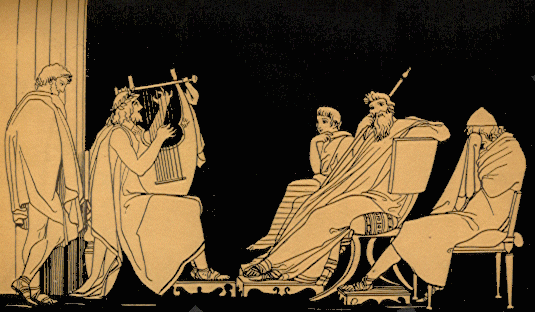This section of books is the first interaction with the character Odysseus on a personal level. Up to this point this man is only spoken of as a captured character whose fate is undecided. Book Five begins with a second council of the gods. Athena is still trying to convince Zeus to let Odysseus escape the clutches of Calypso and travel home safely. To her surprise Zeus has Hermes inform Calypso that she must release Odysseus and give him the means to build a raft. Calypso is disagreeable to this decree but does not want the wrath of Zeus to be placed upon her. After learning of his freedom Odysseus is skeptical and requires Calypso show "good faith" of his safe passage home (197). This is simply shown through Calypso's words. She warns Odysseus that she has no control over the gods and what they may do to him on his voyage home. Through this warning she tries to persuade Odysseus to stay with her on the island. Odysseus' yearn for his homeland and wife is to strong of a pull to hold him there. He had been through so many trials that the simple evidence of tragedy does not sway his decision. After finishing his raft, Odysseus sets sail with provisions provided by Calypso. His journey starts out uneventful and pleasant. It is not until Poseidon discovers the gods release of Odysseus that he begins to question his journey. It is only through the help of Ino, an esteemed mortal living "in the sea's salt depths," that Odysseus survives (369). Once on land, naked and exhausted, Odysseus finds shelter amongst olive branches and falls asleep with the help of Athena. This book gives way to the extremes that Odysseus is willing to face in order to see his homeland. His continued struggle helps him to become a humble man who understands the power of the gods.
Book Six and Seven introduce the audience to the Phaeacians. The princess Nausicaa is the first to speak with Odysseus, after some crafty planning done by Athena. This section helps to show the ability of Athena to be a guide and mentor of Odysseus. After having Odysseus flatter the virgin princess, Athena gives the princess wisdom enough to explain the unique nature of the Phaeacian city to Odysseus. This city is known for being close to the gods. It is not uncommon for gods to visit the city in times of "grand, glorious, sacrifice" (238). Athena made sure Odysseus looked almost god-like to the Phaeacians. This helped Odysseus to be granted passage on their ships. Nausicaa also explains to Odysseus the importance of sailing in the city. She sums it up quite nicely by stating, "Phaeacians, you see, care nothing for bow or quiver, / only for masts and oars and good trim ships themselves- / we glory in our ships, crossing the foaming seas!" (296-298). Through both the help of Athena's guidance and Nausicaa's simple explanations Odysseus is looked fondly upon by the queen and king. Book Seven ends with Odysseus promising to tell the stories of his journey but only after some food and rest, while King Alcinous promises him safe passage on one of their ships.
Something to remember is that Odysseus' identity alludes King Alcinous and the rest of the town. They just know he is a stranger from another land. In Book Eight Alcinous has a council to decide if they should provide Odysseus with a ship back to his homeland. Having been given a god-like appearance from Athena, the council approves this measure. A celebration is in order after the approval of Odysseus' passage.
 |
http://www.brunswick.k12.me.us/hdwyer/
the-odyssey-book-viii-study-guide/ |
Enter Demodocus, a blind bard known for his musical and story-telling talent. Demodocus tells of the struggle between Odysseus and Achilles, this recollection brings tears to Odysseus' eyes. Having noticed Odysseus' grief King Alcinous recommends the town begin the games. Many of the games are measures of physical ability. After watching the men compete Odysseus is challenged by a younger athlete, Broadsea. Homer's depiction of Phaeacian is humorous through his use of names. Many of the "commoners" have names that are nautical themed. This helps the reader to understand the importance of the sea to the town. With the challenge giving way to insults Odysseus gives in to pride and easily beats the other competitors. As typical males the adrenaline begins to show and an outright battle almost begins, but through the wisdom of King Alcinous the aggression is diffused. The town feast again while Demodocus performs a piece about the Trojan horse at the request of Odysseus. Once again memories flood back to the traveler and he is not able to withhold his emotions. King Alcinous stops the music and becomes almost demanding of the identity of Odysseus.

No comments:
Post a Comment